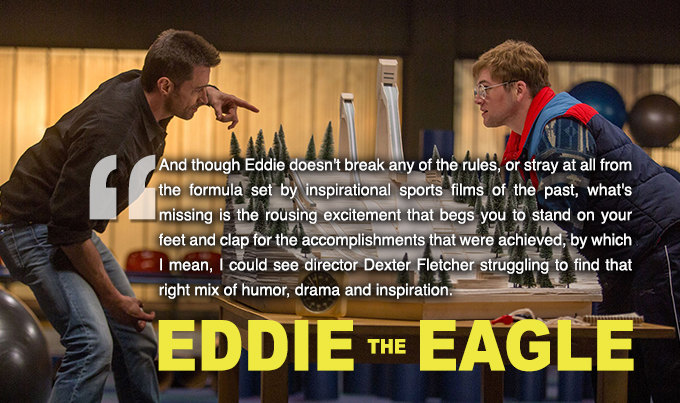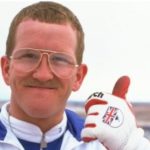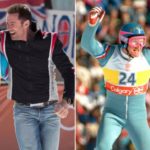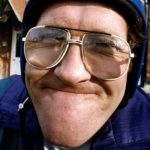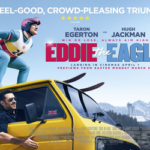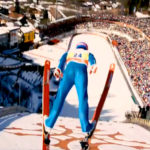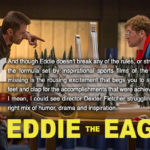“The important thing in the Olympic Games is not to win, but to take part; the important thing in Life is not triumph, but the struggle; the essential thing is not to have conquered but to have fought well” – Pierre de Coubertin
Eddie the Eagle is a film about a heroic British failure, and as such is another heroic British failure. Don’t we just love ’em, these eccentric chaps bristling with derring-do and defiance of authority, the sort who never know they’re defeated, even though victory is a personal battle rather than actually beating opponents. “Play up, play up! And play the game,” as Henry Newbolt famously put it.
What we would do if they ever won goodness only knows… oh yes, I just remembered! We give them knighthoods. How quaint! Michael “Eddie” Edwards never received a knighthood, nor any other gong, but did become a UK folk hero by qualifying for, participating in and earning last place with a personal best and British records in the Olympic 70m and 90m downhill ski-jump events.
More to the point, he survived what could have been a fatal encounter with the hills of Calgary 1988, and as a fine example of a stiff-upper-lip underdog he follows in a fine tradition and takes his place a month the heroes (see here.) Fact is that his personal battle was to learn to ski-jump from scratch, self-funded and contrary to the wishes of his family – his dad allegedly wanted him to learn the plastering business and stop any grand ideas of becoming an Olympian.
More to the point, he had to battle against the hoity-toity British Olympic authorities who clearly did not want him there. They are portrayed as the pantomime villains in the person of the fictional “Dustin Target” (Tim McInnerny, much loved in the Blackadder series.) The blazered ones remind one of Will Carling quote about the top brass running rugby union as “old farts” – and even in a much more successful Olympic climate the treatment of athletes by our authorities has angered many.
These days, Eddie could not have got away with it, since you clearly have to be utterly professional and be in the know. Maybe those were times of innocence?
But let’s return to the reasons why this film, mildly entertaining and diverting as it is, much in the way that Cool Runnings (about the Jamaican bobsleigh team in, wait for it, the 1988 Calgary Winter Olympics!!) In fact, this link lists 11 such examples of unlikely sporting heroes whose exploits against the odds were recorded on film so we could cheer on the underdog.
There are two main issues with the film, one being that it adopts the frequently-used device of creating fictional characters to help tell the story, of which more shortly, and the other being that it rewrites history in many ways. The response on the latter charge is that the press were also telling porky pies and jokingly slurring Edwards from the start. From Wikipedia:
From the beginning, the press version of his story was “embroidered with falsehoods.” “They said I was afraid of heights. But I was doing sixty jumps a day then, which is hardly something someone who was afraid of heights would do.”
His lack of success endeared him to people around the globe. He subsequently became a media celebrity and appeared on talk shows around the world, appearing on The Tonight Show during the Games. The press nicknamed him “Mr. Magoo“, and one Italian journalist called him a “ski dropper.”
With all this to contend with, it was somewhat amazing that Edwards did have the guts to compete, though all the stuff in the film about his coaching by the talented but underperforming Olympic ski jumper Bronson Peary (Hugh Jackman) and his equally fictional coaching hero Warren Sharp (Christopher Walken in unusually understated mode) is, of course, all tosh – and doubtless much more has been embroidered or changed to deliver the required dramatic results, not least the actual distances recorded by Mr Edwards in his 70m and 90m Olympic jumps.
Scriptwriters Sean Macaulay and Simon Kelton would doubtless say there would not have been a peg on which to hang the story otherwise, but even with the fiction woven into the Edwards narrative, director Dexter Fletcher (also a likeable actor and director of the likeable Sunshine On Leith) struggles to keep up the momentum or add thrills to the movie. It struggles to fill its allotted 105 minutes, nor does it achieve the emotional highs the filmmakers were evidently targeting.
Of course, in view of the quote from the founder of the modern Olympic movement (see above), incorporated at the end of the film, it’s worth saying that Eddie had plenty of supporters…
However, admirers praised him as representing the true Olympic spirit as an amateur athlete who wanted to compete at the best of his ability for its own sake, regardless of his chances of winning. At the closing ceremony, the president of the Organizing Committee, Frank King, singled out Edwards for his contribution. King said looking at the competitors: “You have broken world records and you have established personal bests. Some of you have even soared like an eagle.”
…but equally the bureaucrats prevented any repetition of the Eddie scenario, arguably in denial of the Olympic spirit, also disclosed at the end of the movie:
The widespread attention that Edwards received in Calgary was embarrassing to some in the ski jumping establishment. Shortly after the Olympics finished, the entry requirements were strengthened in order to make it nearly impossible for anyone to follow his example.
Even in spite of this mild protest, Eddie the Eagle, the movie, is never more than a mild diversion, even if it is competently done. It was never one you could see troubling the judges on the 90m slopes.

